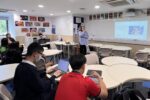Year 12 CAS – Mock Trial Club

CAS stands for Creativity, Action, and Service, and it is one of three essential elements that every student must complete to receive the IB Diploma. While not formally assessed, CAS provides opportunities for students to enhance their personal and interpersonal development through hands-on learning.
One of the components of CAS is a ‘CAS Project’, a collaborative series of student-initiated CAS experiences over several months engaging students in one or more CAS strands (creativity, activity, and service). Following the five CAS stages of Investigation, Preparation, Demonstration, Action, and Reflection, students can explore their passions whilst challenging themselves to initiate purposeful action around defined goals. The following months will bring a series of interviews where the STC Media Team interviews different students around the school to highlight their CAS projects and initiatives.
This week, the STC Mock Trial Club speaks to the STC Media Team about their CAS project. Led by Celine Pretorious, Sylvia Chan, and Ian Fong, the basis of the STC Mock Trial Club stems from their passion for the legal system. Moreover, they wanted to create a CAS project that provides a friendly platform for students to discuss law-related topics and hopefully inspire them to choose law as their career path.
Can you introduce the STC Mock Trial Club? What is the purpose of your CAS project?
The STC Mock Trial Club is a place to develop public speaking, critical thinking and argumentative skills through the medium of mock trials. We integrate procedures and techniques specific to a mock trial and general skills and knowledge that people can apply elsewhere. Similar to debate, MUN, and other public speaking activities, the primary focus of this club is to help students gain confidence in public speaking and their ability to build logical arguments. We hope this activity will foster interest in the legal system and act as a starting point for students to explore the field further.
Are there any events/initiatives planned to take place?
In Term 1, we held a real-life mock trial that culminated from a few months of hard work and planning. We went through simulated trial procedures, the case, and the relevant content in previous sessions, giving the students ample time to prepare and practice. We held the actual mock trial in the SSC, where we tried to emulate the atmosphere of a courtroom as much as possible. For example, we asked the lawyers and witnesses to dress up in formal clothing, invited an audience and jury to watch the trial, and filmed some sections for posterity. Currently, we are in the middle of the second case. We still plan to hold a proper adjudicated mock trial to conclude this case, but we will have to modify the logistics and adapt it for Zoom.
Can you briefly outline the mock trial procedure for those unfamiliar with the activity?
The procedure has a lot of steps and can take a while to explain. Still, the most basic structure would be opening remarks, direct examinations of witnesses, cross-examinations of witnesses, closing statements and jury instructions and deliberation. If you want to learn more, join our club!
Taking part in a mock trial requires preparation and skill and can be pretty stressful. What guidance would you give to someone hoping to improve research skills and public speaking?
There are a couple of things you need to be aware of for research skills. One is critical reading strategies, which means annotations, summarising, and paraphrasing content to make it easier to understand. Next is close reading skills; spot language patterns, argumentation patterns, logical reasoning patterns, strands, oppositions, etc. Last is your evaluation skills – know the credibility of your sources, the different perspectives and how to argue against them.
It sounds cliche, but it’s also essential to know your material inside out so you won’t stumble during the real thing. We found it especially compelling to tell stories in your speeches; using effective language techniques can sway the jury to your side. Overall, don’t be afraid to put yourself out there and practice speaking – the Romans didn’t build Rome in a day, so start small and build your confidence.
Written and edited by Kadence Wong

